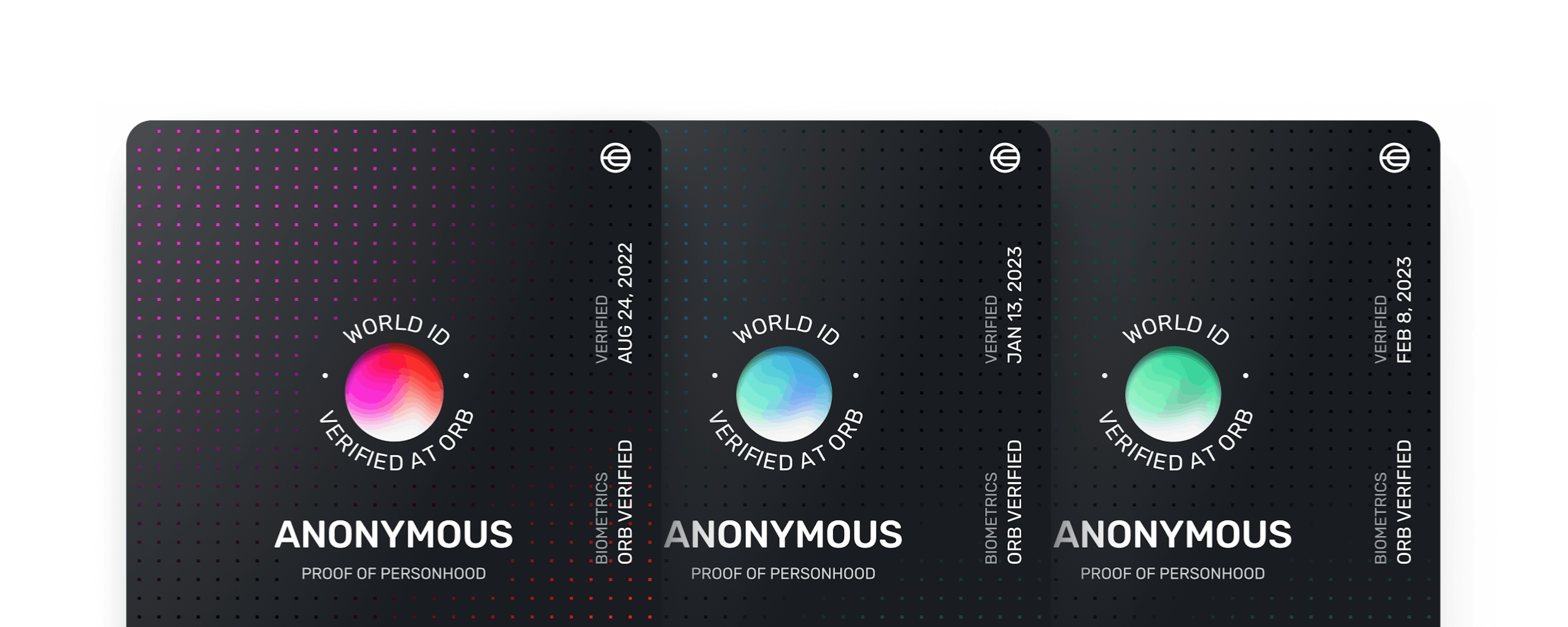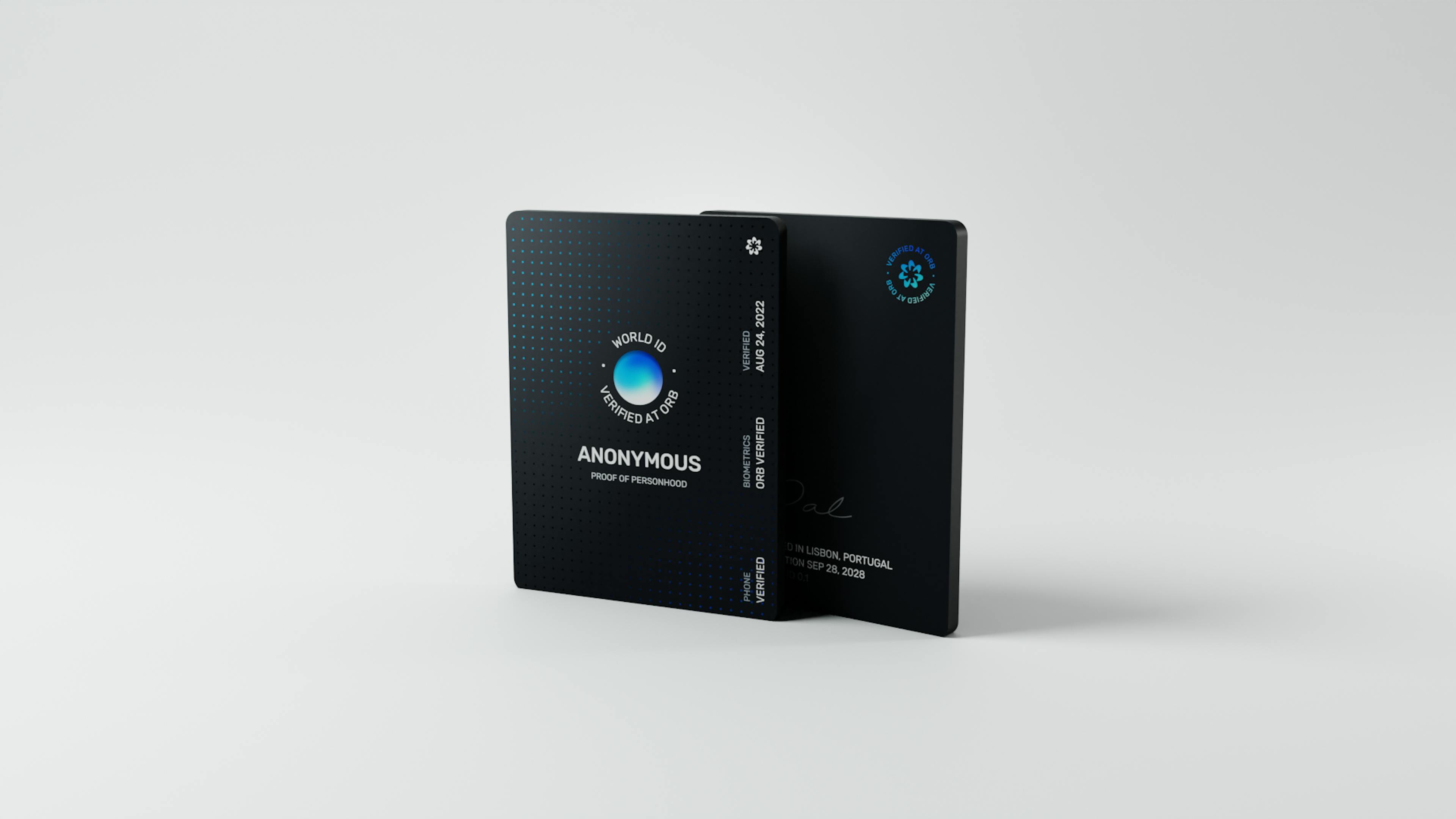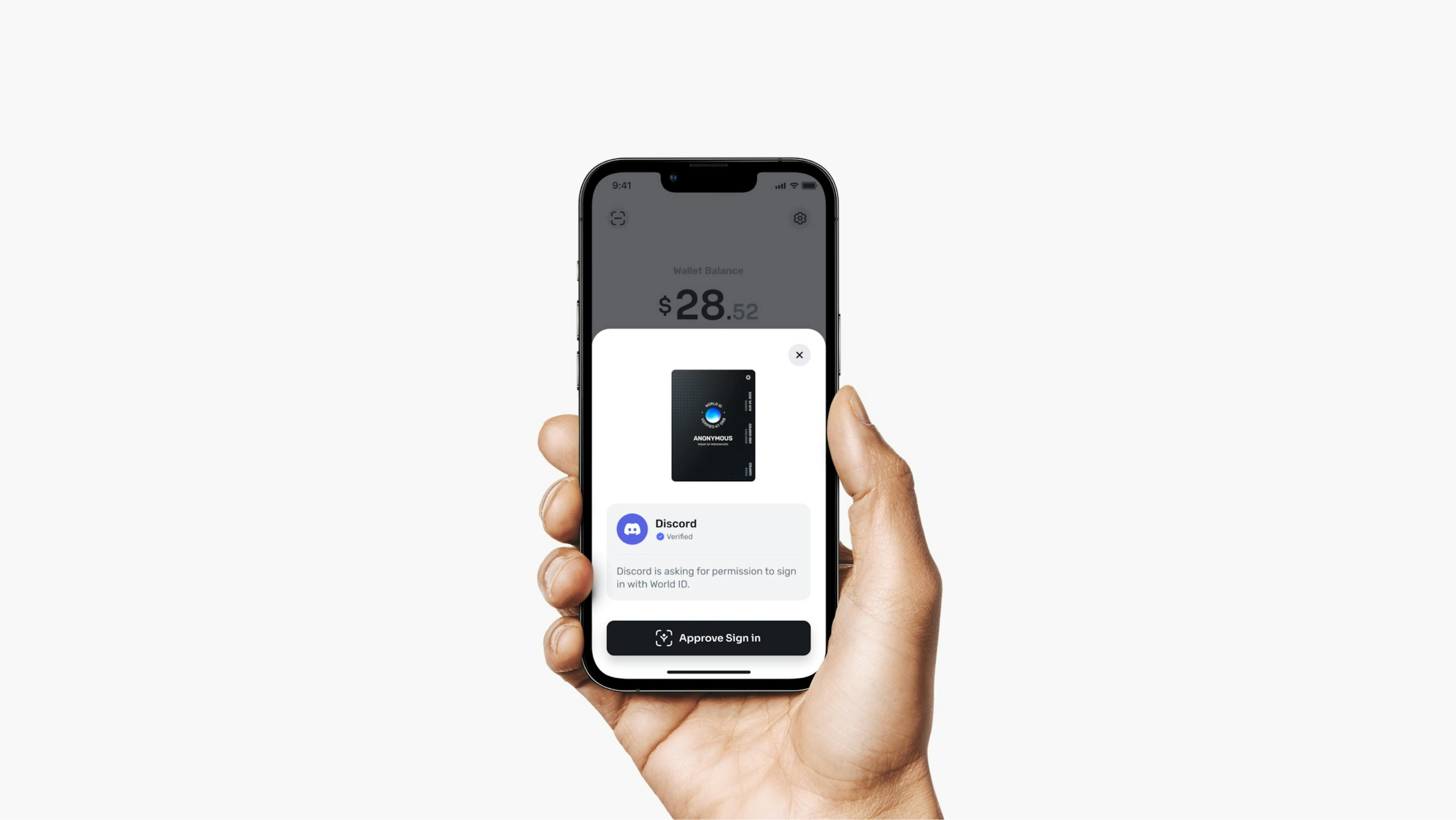Blog
Announcements
Introducing World ID and SDK
Introducing World ID and SDK
World ID is a new privacy-first protocol that brings global proof of personhood to the internet.

- World ID is a new privacy-first decentralized identity protocol. It enables seamless sign in to websites, mobile apps and crypto dapps, while proving you’re a unique and real person without sharing personal data like names, emails, etc.
- World ID supports multiple types of personhood verifications. At launch, this includes phone number verification for easy access to anyone with a smartphone and Orb biometric verification for extreme accuracy.
- Early access for mobile, web and crypto apps to the World ID SDK is now available here.
Digital identity has been an open problem since the invention of the internet. Even today, more than 50% of the world’s population doesn’t have a verifiable legal ID. As we venture into the exciting new Age of Artificial Intelligence, solving proof of personhood is more important than ever—specifically to ensure democratic access and governance of these systems, fairly distribute the benefits generated and know who and what to trust online.
Worldcoin aims to address this in a privacy-first, self-sovereign and decentralized way. This is made possible through the World ID open protocol. If successful, it will become the largest network of authentic humans on the internet, as a public good.
Today we’re excited to share the first look at World ID—the underlying identity protocol powered by zero-knowledge cryptography—and the SDK that will enable developers to leverage this powerful new primitive.

Fig. 1
A person’s World ID as verified by an Orb.
World ID and Proof of Personhood
One way to think about World ID is as a global digital passport that lives locally on its holder’s phone. World ID’s most important property is that the holder can use it to prove that they are a real and unique person without sharing personal data using zero-knowledge proofs.
World ID supports multiple types of verifications that accomplish this with varying degrees of accuracy. At launch, this includes phone number verification and privacy-preserving iris verifications as the flagship credential given its inclusivity, scalability and robustness.
The first hardware device to support this standard is the Orb, an open iris imaging device developed by TFH. It’s mobile and easy to use, designed to operate in untrusted environments and, above all, engineered to protect privacy even beyond the zero-knowledge cryptography of the base protocol by running its seven neural networks locally on-device. Learn more about the Orb.
Importantly, World ID is not derived from or tied to its holder’s biometrics, phone number, crypto wallet or any other identifier. Following the passport analogy, proof of personhood verifications—including the Orb’s—are essentially stamps that allow the holder to prove that a specific passport has been verified, without revealing information about the verification or the passport itself.

Fig. 2
The Orb, which verifies a person’s biometrics and issues the relevant credential to verify a person’s World ID.
Using World ID
Getting your World ID
It’s as simple as downloading a compatible wallet, starting with World App. More will be coming soon. Phone verification is available in most countries for users and developers starting today. Given Worldcoin is still in Beta, Orb availability is mostly limited to Argentina, Chile, India, Kenya, Portugal and Spain, as well as demos at blockchain and identity conferences. A broader rollout is expected later this year, and nearby devices can be found using the World App.
Sign in with World ID
The simplest way to use World ID is as a sign in method. Upon selecting Sign in with Worldcoin on a website, mobile app or crypto dapp, you approve or reject the request from your self-custodial wallet to authenticate and prove you’re a real and unique person.
One person does not always equal one account, so the system also supports pseudonyms. Apps can allow their users to set up multiple accounts with one World ID in such a way that only the user knows they all belong to their World ID. This is useful if, for example, a social media app wants to limit people to five verified profiles to prevent bots while maintaining privacy.
When signing in with Worldcoin, your World ID, app accounts, proof-of-personhood verifications and wallets are not linked together. No one, not even Worldcoin contributors or application developers, can track you across websites, identify the World ID connected to your account or generally know more about you. Learn more about the technical details of privacy.
To see what this looks like in action, visit the Worldcoin Discord and verify with World ID to get special permissions.

Fig. 3
Person using Sign in with Worldcoin in the World App to authenticate for an app.
Anonymous Actions
While Sign in with Worldcoin is far beyond the state of the art of digital privacy, some actions require an even more extreme level of protection. An example of this is voting. Whether you’re talking about DAO governance or government elections, it’s important that each person only votes once to preserve the integrity of the results. It’s equally important that people are able to do so in a privacy-preserving way.
For this reason, World ID also supports Anonymous Actions. In this setup, instead of authenticating your World ID only one time in the given app, you generate individual zero-knowledge proofs to show that you’re a real person that has never performed that specific action before.
Building with World ID
Worldcoin is a permissionless protocol, which means anyone can integrate with it without involvement from the teams that contribute to its development. The SDK makes web, mobile and onchain integrations fast and simple. It includes tools like a web widget (JS), Developer Portal, development simulator, examples, guides and more.
World ID is also designed to support existing open identity standards, including OAuth 2.0 and OIDC (OpenID Connect) presently, and soon Verifiable Credentials (VCs), Decentralized Identifiers (DIDs) and Sign in with Ethereum (SIWE).
Developers interested in early access to the SDK Beta can register to the waitlist, with a public rollout happening gradually over the following weeks. To learn more about the protocol and SDK, you can also review the documentation.
Applications and use cases
Global proof of personhood will unlock a new generation of products and services, many of which will be surprising even for those that spend their days thinking about this. Still, the community has compiled a collection of some of the applications that will emerge, including:
- Social networks. Bot protection, community moderation, content attribution.
- Voting. DAO governance, government elections, online polls, census.
- Financial services. Undercollateralized lending, card fraud, compliance.
- Customer incentives. Loyalty programs, coupons, referrals, free trials.
- Marketplaces. Reputation, fake reviews, fake transactions, scalper prevention.
- Money distribution. Government welfare, non-profit aid, scholarships, crypto airdrops, UBI.
What’s next
As momentum continues to build for Worldcoin with milestones such as crossing 1M Beta signups (now 1.3M), opening up the Orb and laying the path to decentralization, it’s important to remember that these are still the early days and there is much left to be done as the project graduates from its Beta phase.
Development of the World ID Protocol and SDK will continue with upcoming functionality such as authentication powered by on-device ZKML, alternative personhood verifications including ZK KYC, and generic identity credentials with support for selective disclosures and attestations. More details to come over the next weeks and months. If you’re passionate about private digital identity and want to help shape the future of World ID, please consider joining a team in the ecosystem, supporting Semaphore and WalletConnect which enables pieces of World ID, or contributing directly on Discord and GitHub.
In the meantime, we’re excited to hear the community’s feedback on this initial preview and to see what developers around the world build with World ID.
The above content speaks only as of the date indicated. Further, it is subject to risks, uncertainties and assumptions, and so may be incorrect and may change without notice. A full disclaimer can be found in our Terms of Use and Important User Information can be found on our Risks page.
